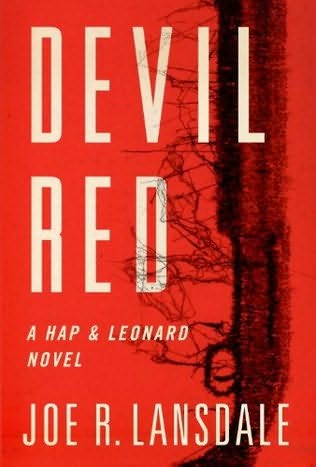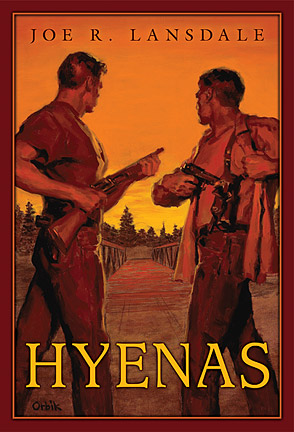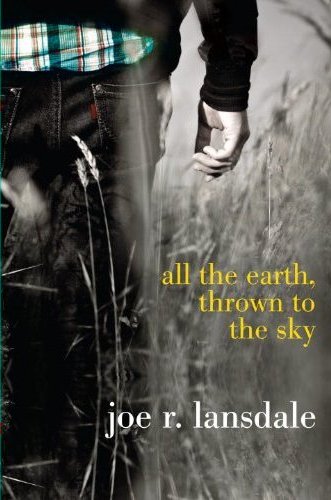

The May Special Guest is Joe R. Lansdale
You can visit Joe at: http://www.joerlansdale.com/

FISH NIGHT
by Joe R. Lansdale
It was a bleached-bone afternoon with a cloudless sky and a monstrous sun. The air trembled like a mass of gelatinous ectoplasm. No wind blew.
Through the swelter came a worn, black Plymouth, coughing and belching white smoke from beneath its hood. It wheezed twice, backfired loudly, died by the side of the road.
The driver got out and went around to the hood. He was a man in the hard winter years of life, with dead, brown hair and a heavy belly riding his hips. His shirt was open to the navel, the sleeves rolled up past his elbows. The hair on his chest and arms was gray.
A younger man climbed out on the passenger side, went around front too.
Yellow sweat‑explosions stained the pits of his white shirt. An unfastened, striped tie was draped over his neck like a pet snake that had died in its sleep.
“Well?” the younger man asked.
The old man said nothing. He opened the hood. A calliope note of steam blew out from the radiator in a white puff, rose to the sky, turned clear.
“Damn,” the old man said, and he kicked the bumper of the Plymouth as if he were kicking a foe in the teeth. He got little satisfaction out of the action, just a nasty scuff on his brown wingtip and a jar to his ankle that hurt like hell.
“Well?” the young man repeated.
“Well what? What do you think? Dead as the can-opener trade this week. Deader. The radiator’s chickenpocked with holes.”
“Maybe someone will come by and give us a hand.”
“Sure.”
“A ride anyway.”
“Keep thinking that, college boy.”
“Someone is bound to come along,” the young man said.
“Maybe. Maybe not. Who else takes these cutoffs? The main highway, that’s where everyone is. Not this little no-account shortcut.” He finished by glaring at the young man.
“I didn’t make you take it,” the young man snapped. “It was on the map. I told you about it, that’s all. You chose it. You’re the one that decided to take it. It’s not my fault. Besides, who’d have expected the car to die?”
“I did tell you to check the water in the radiator, didn’t I? Wasn’t that back as far as El Paso?”
“I checked. It had water then. I tell you, it’s not my fault. You’re the one that’s done all the Arizona driving.”
“Yeah, yeah,” the old man said, as if this were something he didn’t want to hear. He turned to look up the highway.
No cars. No trucks. Just heat waves and miles of empty concrete in sight.
They seated themselves on the hot ground with their backs to the car. That way it provided some shade — but not much. They sipped on a jug of lukewarm water from the Plymouth and spoke little until the sun fell down. By then they had both mellowed a bit. The heat had vacated the sands and the desert chill had settled in. Where the warmth had made the pair snappy, the cold drew them together.
The old man buttoned his shirt and rolled down his sleeves while the young man rummaged a sweater out of the back seat. He put the sweater on, sat back down. “I’m sorry about this,” he said suddenly.
“Wasn’t your fault. Wasn’t anyone’s fault. I just get to yelling sometime, taking out the can‑opener trade on everything but the can openers and myself. The days of the door‑to‑door salesman are gone, son.”
“And I thought I was going to have an easy summer job,” the young man said.
The old man laughed. “Bet you did. They talk a good line, don’t they?”
“I’ll say!”
“Make it sound like found money, but there ain’t no found money, boy. Ain’t nothing simple in this world. The company is the only one ever makes any money. We just get tireder and older with more holes in our shoes. If I had any sense I’d have quit years ago. All you got to make is this summer —”
“Maybe not that long.”
“Well, this is all I know. Just town after town, motel after motel, house after house, looking at people through screen wire while they shake their heads No. Even the cockroaches at the sleazy motels begin to look like little fellows you’ve seen before, like maybe they’re door‑to‑door peddlers that have to rent rooms too.”
The young man chuckled. “You might have something there.”
They sat quietly for a moment, welded in silence. Night had full grip on the desert now. A mammoth gold moon and billions of stars cast a whitish glow from eons away.
The wind picked up. The sand shifted, found new places to lie down. The undulations of it, slow and easy, were reminiscent of the midnight sea. The young man, who had crossed the Atlantic by ship once, said as much.
“The sea?” the old man replied. “Yes, yes, exactly like that. I was thinking the same. That’s part of the reason it bothers me. Part of why I was stirred up this afternoon. Wasn’t just the heat doing it. There are memories of mine out here,” he nodded at the desert, “and they’re visiting me again.”
The young man made a face. “I don’t understand.”
“You wouldn’t. You shouldn’t. You’d think I’m crazy.”
“I already think you’re crazy. So tell me.”
The old man smiled. “All right, but don’t you laugh.”
“I won’t.”
A moment of silence moved in between them. Finally the old man said, “It’s fish night, boy. Tonight’s the full moon and this is the right part of the desert if memory serves me, and the feel is right — I mean, doesn’t the night feel like it’s made up of some soft fabric, that it’s different from other nights, that it’s like being inside a big, dark bag, the sides sprinkled with glitter, a spotlight at the top, at the open mouth, to serve as a moon?”
“You lost me.”
The old man sighed. “But it feels different. Right? You can feel it too, can’t you?”
“I suppose. Sort of thought it was just the desert air. I’ve never camped out in the desert before, and I guess it is different.”
“Different, all right. You see, this is the road I got stranded on twenty years back. I didn’t know it at first, least not consciously. But down deep in my gut I must have known all along I was taking this road, tempting fate, offering it, as the football people say, an instant replay.”
“I still don’t understand about fish night. What do you mean, you were here before?”
“Not this exact spot, somewhere along in here. This was even less of a road back then than it is now. The Navajos were about the only ones who traveled it. My car conked out, like this one today, and I started walking instead of waiting. As I walked the fish came out. Swimming along in the starlight pretty as you please. Lots of them. All the colors of the rainbow. Small ones, big ones, thick ones, thin ones. Swam right up to me…right through me! Fish just as far as you
could see. High up and low down to the ground.
“Hold on, boy. Don’t start looking at me like that. Listen: You’re a college boy, you know something about these things. I mean, about what was here before we were, before we crawled out of the sea and changed enough to call ourselves men. Weren’t we once just slimy things, brothers to the things that swim?”
“I guess, but —”
“Millions and millions of years ago this desert was a sea bottom. Maybe even the birthplace of man. Who knows? I read that in some science books. And I got to thinking this: If the ghosts of people who have lived can haunt houses, why can’t the ghosts of creatures long dead haunt where they once lived, float about in a ghostly sea?”
“Fish with a soul?”
“Don’t go small-mind on me, boy. Look here: Some of the Indians I’ve talked to up north tell me about a thing they call the manitou. That’s a spirit. They believe everything has one. Rocks, trees, you name it. Even if the rock wears to dust or the tree gets cut to lumber, the manitou of it is still around.”
“Then why can’t you see these fish all the time?”
“Why can’t we see ghosts all the time? Why do some of us never see them? Time’s not right, that’s why. It’s a precious situation, and I figure it’s like some fancy time lock — like the banks use. The lock clicks open at the bank, and there’s the money. Here it ticks open and we get the fish of a world long gone.”
“Well, it’s something to think about,” the young man managed.
The old man grinned at him. “I don’t blame you for thinking what you’re thinking. But this happened to me twenty years ago and I’ve never forgotten it. I saw those fish for a good hour before they disappeared. A Navajo came along in an old pickup right after and I bummed a ride into town with him. I told him what I’d seen. He just looked at me and grunted. But I could tell he knew what I was talking about. He’d seen it too, and probably not for the first time.
“I’ve heard that Navajos don’t eat fish for some reason or another, and I bet it’s the fish in the desert that keep them from it. Maybe they hold them sacred. And why not? It was like being in the presence of the Creator; like crawling back inside your mother and being unborn again, just kicking around in the liquids with no cares in the world.”
“I don’t know. That sounds sort of…”
“Fishy?” The old man laughed. “It does, it does. So this Navajo drove me to town. Next day I got my car fixed and went on. I’ve never taken that cutoff again — until today, and I think that was more than accident. My subconscious was driving me. That night scared me, boy, and I don’t mind admitting it. But it was wonderful too, and I’ve never been able to get it out of my mind.”
The young man didn’t know what to say.
The old man looked at him and smiled. “I don’t blame you,” he said. “Not even a little bit. Maybe I am crazy.”
They sat awhile longer with the desert night, and the old man took his false teeth out and poured some of the warm water on them to clean them of coffee and cigarette residue.
“I hope we don’t need that water,” the young man said.
“You’re right. Stupid of me! We’ll sleep awhile, start walking before daylight. It’s not too far to the next town. Ten miles at best.” He put his teeth back in.
“We’ll be just fine.”
The young man nodded.
No fish came. They did not discuss it. They crawled inside the car, the young man in the front seat, the old man in the back. They used their spare clothes to bundle under, to pad out the cold fingers of the night.
Near midnight the old man came awake suddenly and lay with his hands behind his head and looked up and out the window opposite him, studied the crisp desert sky.
And a fish swam by.
Long and lean and speckled with all the colors of the world, flicking its tail as if in goodbye. Then it was gone.
The old man sat up. Outside, all about, were the fish — all sizes, colors, and shapes.
“Hey, boy, wake up!”
The younger man moaned.
“Wake up!”
The young man, who had been resting face down on his arms, rolled over. “What’s the matter? Time to go?”
“The fish.”
“Not again.”
“Look!”
The young man sat up. His mouth fell open. His eyes bloated. Around and around the car, faster and faster in whirls of dark color, swam all manner of fish.
“Well, I’ll be… How?”
“I told you, I told you.”
The old man reached for the door handle, but before he could pull it a fish swam lazily through the back window glass, swirled about the car, once, twice, passed through the old man’s chest, whipped up and went out through the roof.
The old man cackled, jerked open the door. He bounced around beside the road. Leaped up to swat his hands through the spectral fish. “Like soap bubbles,” he said. “No. Like smoke!”
The young man, his mouth still agape, opened his door and got out. Even high up he could see the fish. Strange fish, like nothing he’d ever seen pictures of or imagined. They flitted and skirted about like flashes of light.
As he looked up, he saw, nearing the moon, a big dark cloud. The only cloud in the sky. That cloud tied him to reality suddenly, and he thanked the heavens for it. Normal things still happened. The whole world had not gone insane.
After a moment the old man quit hopping among the fish and came out to lean on the car and hold his hand to his fluttering chest.
“Feel it, boy? Feel the presence of the sea? Doesn’t it feel like the beating of your own mother’s heart while you float inside the womb?”
And the younger man had to admit that he felt it, that inner rolling rhythm that is the tide of life and the pulsating heart of the sea.
“How?” the young man said. “Why?”
“The time lock, boy. The locks clicked open and the fish are free. Fish from a time before man was man. Before civilization started weighing us down. I know it’s true. The truth’s been in me all the time. It’s in us all.”
“It’s like time travel,” the young man said. “From the past to the future, they’ve come all that way.”
“Yes, yes, that’s it… Why, if they can come to our world, why can’t we go to theirs? Release that spirit inside of us, tune into their time?”
“Now, wait a minute…”
“My God, that’s it! They’re pure, boy, pure. Clean and free of civilization’s trappings. That must be it! They’re pure and we’re not. We’re weighted down with technology. These clothes. That car.”
The old man started removing his clothes.
“Hey!” the young man said. “You’ll freeze.”
“If you’re pure, if you’re completely pure,” the old man mumbled, “that’s it…yeah, that’s the key.”
“You’ve gone crazy.”
“I won’t look at the car,” the old man yelled, running across the sand, trailing the last of his clothes behind him. He bounced about the desert like a jackrabbit.
“God, God, nothing is happening, nothing,” he moaned. “This isn’t my world. I’m of that world. I want to float free in the belly of the sea, away from can openers and cars and —”
The young man called the old man’s name. The old man did not seem to hear.
“I want to leave here!” the old man yelled. Suddenly he was springing about again. “The teeth!” he yelled. “It’s the teeth. Dentist, science, foo!” He punched a hand into his mouth, plucked the teeth free, tossed them over his shoulder.
Even as the teeth fell the old man rose. He began to stroke. To swim up and up and up, moving like a pale, pink seal among the fish.
In the light of the moon the young man could see the pooched jaws of the old man, holding the last of the future’s air. Up went the old man, up, up, up, swimming strong in the long‑lost waters of a time gone by.
The young man began to strip off his own clothes. Maybe he could nab him, pull him down, put the clothes on him. Something… God, something… But, what if he couldn’t come back? And there were the fillings in his teeth, the metal rod in his back from a motorcycle accident. No, unlike the old man, this was his world and he was tied to it. There was nothing he could do.
A great shadow weaved in front of the moon, made a wriggling slat of darkness that caused the young man to let go of his shirt buttons and look up.
A black rocket of a shape moved through the invisible sea: a shark, the granddaddy of all sharks, the seed for all of man’s fears of the deeps.
And it caught the old man in its mouth, began swimming upward toward the golden light of the moon. The old man dangled from the creature’s mouth like a ragged rat from a house cat’s jaws. Blood blossomed out of him, coiled darkly in the invisible sea.
The young man trembled. “Oh God,” he said once.
Then along came that thick dark cloud, rolling across the face of the moon. Momentary darkness.
And when the cloud passed there was light once again, and an empty sky.
No fish.
No shark.
And no old man.
Just the night, the moon, and the stars.
Joe R. Lansdale is the multi-award winning author of thirty novels and over two hundred short stories, articles and essays. He has written screenplays, teleplays, comic book scripts, and occasionally teaches creative writing and screenplay writing at Stephen F. Austin State University. He has received The Edgar Award, The Grinzani Prize for Literature, seven Bram Stoker Awards, and many others.
His stories Bubba Ho-Tep and Incident On and Off a Mountain Road were both filmed. He is the founder of the martial arts system Shen Chuan, and has been in the International Martial Arts Hall of Fame four times. He lives in East Texas with his wife, Karen.
Visit Joe R. Lansdale HERE.
See all of Joe R. Lansdale's books HERE.
Devil Red: The newest in the Hap and Leonard series.


COMING SOON:

All the Earth, Thrown to the Sky: Jack Catcher's parents are dead—his mom died of sickness and his dad of a broken heart—and he has to get out of Oklahoma, where dust storms have killed everything green, hopeful, or alive. When former classmate Jane and her little brother Tony show up in his yard with plans to steal a dead neighbor's car and make a break for Texas, Jack doesn't need much convincing. But a run-in with one of the era's most notorious gangsters puts a crimp in Jane's plan, and soon the three kids are hitching the rails among hoboes, gangsters, and con men, racing to warn a carnival wrestler turned bank robber of the danger he faces and, in the process, find a new home for themselves. This road trip adventure from the legendary Joe R. Lansdale is a thrilling and colorful ride through Depression-era America.